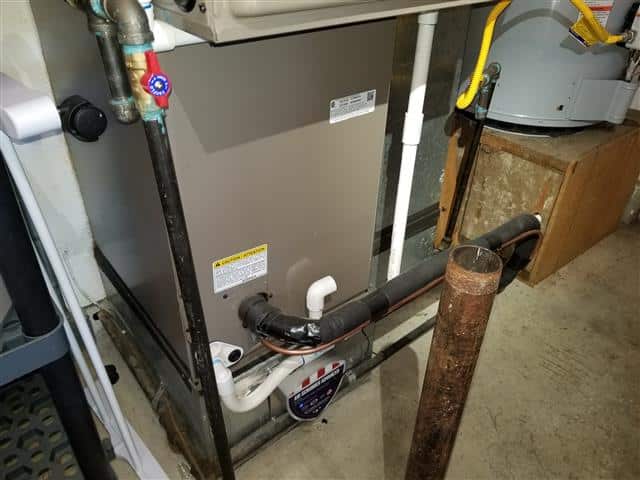Refrigerant Lines: What Are They?
To move refrigerant between the indoor and outdoor units, refrigerant lines are essential parts of an air conditioning system. The heat exchange process that enables cooling is facilitated by these lines. Generally speaking, refrigerant lines come in two varieties:
- Low-pressure refrigerant gas is transported from the evaporator coil to the compressor via the suction line.
- The high-pressure refrigerant liquid is sent from the condenser to the evaporator coil via the liquid line.
Insulation is crucial since the suction line, in particular, is vulnerable to temperature changes and condensation.
Why Should Refrigerant Lines Be Insulated?
Insulating refrigerant lines is essential for the following strong reasons:
· Reducing Energy Loss:
Substances at different temperatures are transported using refrigerant lines. Heat transfer results from these lines’ exposure to ambient air in the absence of insulation. This heat transfer raises energy consumption and compromises the refrigerant’s efficiency. Insulation ensures optimal system performance by reducing this heat exchange.
· Cutting Down on Condensation:
Condensation occurs on the surface because the suction line is frequently cooler than the ambient air. Water stains, mould growth, and damage to adjacent components can all result from excessive moisture. Insulation serves as a barrier to stop the formation of condensation.
· Enhancing Cooling Efficiency:
Throughout its cycle, the refrigerant remains at the proper temperature thanks to proper insulation. This regularity lessens the pressure on the AC system and lowers utility expenses by enabling it to cool your house or building more efficiently.
· Preventing Environmental Damage to the Lines:
Outdoor refrigerant lines are subject to physical impacts, high temperatures, and ultraviolet radiation. These elements have the potential to deteriorate exposed lines over time. Insulation prolongs the life of the refrigerant lines by adding a layer of protection.
· Observance of Building Codes:
Insulating AC refrigerant lines is required by numerous municipal building rules. Following these rules helps to prevent legal problems during property sales or inspections, in addition to ensuring efficiency and safety.
Extra Advantages of Insulating Refrigerant Lines:
Insulating refrigerant lines has several benefits beyond the obvious ones of efficiency, line protection, and condensation prevention:
· Reduction of Noise:
As the refrigerant passes through the system, refrigerant lines may produce noise and vibrations, particularly in older or poorly constructed systems. A calmer interior environment is achieved by reducing noise transmission and dampening these vibrations with proper insulation.
· Better Effect on the Environment:
The environmental impact of your air conditioning system is closely related to its energy efficiency. Insulating refrigerant lines lowers system energy consumption, which lowers greenhouse gas emissions and encourages sustainability. This is particularly important in areas with strict environmental laws.
· Improved Quality of Indoor Air:
Insulating the refrigerant lines lowers the chance of mold and mildew formation by preventing condensation. Mold can have a detrimental effect on indoor air quality and provide health hazards, especially to those who have respiratory or allergy disorders.
· Extended System Life:
The AC compressor and other parts are spared needless stress when the refrigerant line is adequately insulated. Reduced strain results in reduced wear and tear, which can prolong the system’s lifespan and postpone the need for expensive repairs.
Insulation and Modern Cooling Agents:
In order to comply with new environmental regulations, refrigerants and insulating materials must change. Compared to previous refrigerants like R-22, modern refrigerants like R-32 and hydrofluoroolefins (HFOs) frequently function at higher pressures and temperatures. For insulation to be effective and safe, it must be compatible with these circumstances.
Important Factors for Modern Refrigerants:
- Heat Conductivity: Make sure the insulation can withstand the temperature changes brought on by more recent refrigerants.
- Chemical Resistance: Select materials that won’t react chemically with the refrigerant.
- Longevity: Choose materials that are resilient to rising temperatures and pressures over time.
Cost Effects of the Refrigerant Line Insulation:
- First Investment: Labor, line length, and material type are some of the variables that affect the cost of insulating refrigerant lines. The long-term energy and maintenance savings outweigh the initial cost, even though it might appear high.
- Energy Savings: An AC system with adequate insulation can cut energy use by 5–15%. The original cost of insulation may eventually be covered by these savings.
- Preventing the Cost of Repairs: Insulation lessens stress on the air conditioning system and guards against damage to refrigerant lines. This lowers the possibility of expensive replacements or repairs, ultimately saving you money.
Frequently Asked Questions:
1. Why Is Leak Testing in Refrigerant Piping Important?
By locating possible weak spots or damaged regions prior to the system being charged, leak testing guarantees the reliability of refrigerant lines. Reduced cooling efficiency, environmental damage, and refrigerant loss are all consequences of leaks. To verify that a system is leak-free, techniques like electronic leak detectors or nitrogen pressure testing are employed.
2. What Common Problems Do Air Conditioner Piping Insulation Issues Cause?
Wear and tear, UV exposure and incorrect installation are common issues with insulation. Heat can enter the refrigerant system through damaged insulation, which lowers efficiency and leads to condensation accumulation. Long-lasting performance is ensured by frequent maintenance and high-quality, UV-resistant insulating materials.
3. How Do Compressors Function in Refrigerant Systems?
In order to facilitate effective heat transfer in the condenser and evaporator, the compressor raises the temperature and pressure of the refrigerant. It is an essential part that depends on appropriate oil lubrication and refrigerant flow. Compressor malfunctions frequently signal problems with the refrigerant, such as leakage, overcharging, or undercharging.
4. What Effect Does Refrigerant Flow Have on System Performance?
The performance of an air conditioner is directly impacted by efficient refrigerant flow, which guarantees constant heat absorption and rejection. Inefficiencies can result from flow disruptions caused by obstructions, incorrect pipe diameters, or low refrigerant levels. Energy efficiency and cooling capacity are increased by maintaining an ideal refrigerant charge and making sure that pipes are clear.

